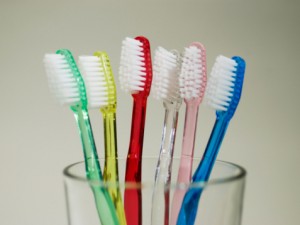4 Tooth-Saving Tips for When You Can’t Brush
Help keep your teeth a little cleaner and healthier even when you can’t brush

Rinse With Water
A big part of the purpose of brushing and flossing is to remove little bits of food that may be trapped between teeth or along the gum line. If you don’t have your toothbrush and toothpaste with you, you can at least rinse your mouth with water to help dislodge any stray food particles and avoid giving the bacteria that cause tooth decay and gum disease a free lunch.
Drink Milk
Research has shown that the pH level within your mouth can have a big effect on the development of cavities. In general, the more acidic your mouth is, the happier bacteria will be. After eating sugary foods that bacteria love, the acidity in your mouth will increase. However, a recent study has shown that by drinking milk after eating, acids can be neutralized, bringing the overall pH of the mouth down to a level that is less conducive to tooth decay.
“Brush” with Your Tongue
Because saliva can form a natural barrier between teeth and bacteria, and also has the effect of neutralizing acidity over time, simply running your tongue over your teeth can help reduce your risk of tooth decay when you can’t brush. “Brushing” with your tongue can also help dislodge bits of food, especially when combined with rinsing with water.
Chew Sugar-Free Gum
Chewing sugar-free gum after eating helps keep teeth clean in two important ways. First, it removes food particles. Second, it stimulates the production of more saliva. Researchers have found that saliva contains some sugar complexes that can serve as a natural defense against tooth decay by repelling bacteria. As an added benefit, chewing sugar-free gum when you can’t brush will also leave your mouth with a fresh taste and help prevent bad breath odors.
There’s No Substitute for Brushing!
Of course, when it comes to keeping your teeth as clean and healthy as possible, there is no substitute for brushing. Saliva alone won’t do the job because in addition to compounds that repel bacteria, it also contains compounds that can help bacteria. Be sure you only use the above tips as a supplement to brushing twice a day and visiting your dentist for cleanings & exams regularly.




